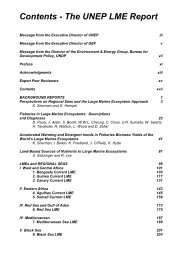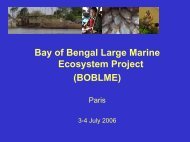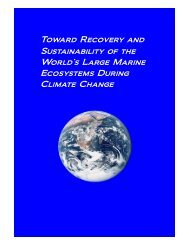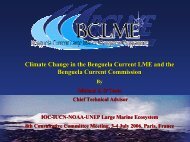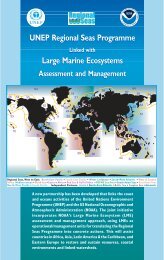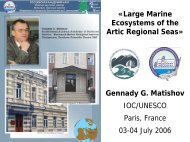Sustaining the World's Large Marine Ecosystems
Sustaining the World's Large Marine Ecosystems
Sustaining the World's Large Marine Ecosystems
You also want an ePaper? Increase the reach of your titles
YUMPU automatically turns print PDFs into web optimized ePapers that Google loves.
Seitzinger and Lee (2008) who, based on a business as usual (BAU) modeling<br />
scenario, estimate a potential doubling of nutrient loading into LMEs around <strong>the</strong><br />
globe by 2050. The LME briefs demonstrate <strong>the</strong> utility of a generic ecosystembased<br />
approach that uses comparable time series indicators for each of <strong>the</strong> 5<br />
modules to serve as <strong>the</strong> basis for assessing changing conditions among <strong>the</strong><br />
world’s LMEs.<br />
Outreach and educational uses of <strong>the</strong> UNEP LME Report: By identifying <strong>the</strong><br />
impacts of ecosystem drivers of alteration such as nutrient over-enrichment,<br />
pollution, over-fishing, and global warming, <strong>the</strong> UNEP LME report serves as a<br />
useful scientific reference as well as an educational and outreach document. The<br />
information is both quantitative and comparative, with lessons to be learned from<br />
comparing <strong>the</strong> marine geography, LME productivity, fish and fisheries, pollution<br />
and ecosystem health, socioeconomics, and governance conditions between and<br />
amongst <strong>the</strong> 64 LMEs. The briefs pertaining to <strong>the</strong> 16 LMEs for which <strong>the</strong> GEF<br />
has funded projects provide fur<strong>the</strong>r detail on <strong>the</strong>ir progress in turning <strong>the</strong> corner<br />
to recover depleted fisheries, reduce coastal pollution, and restore damaged<br />
habitats.<br />
The report is intended for use by educators, scientists, resource managers and<br />
<strong>the</strong> general public. The entire report can be downloaded from <strong>the</strong> LME website<br />
at: www.lme.noaa.gov/. To obtain a hard copy of <strong>the</strong> UNEP LME Report, please<br />
contact: NOAA <strong>Large</strong> <strong>Marine</strong> Ecosystem Program, Tarzwell Drive, Narragansett,<br />
RI 02882, USA. Tel: +1 401 782-3211; FAX: +1 401 782-3201. Emails:<br />
Kenneth.Sherman@noaa.gov, MC.Aquarone@ noaa.gov.<br />
References<br />
Levin SA, Lubchenco J. 2008. Resilience, robustness, and marine ecosystem-based<br />
management. BioScience 58(1): 27-32.<br />
Lubchenco J. 1994. The scientific basis of ecosystem management. Framing <strong>the</strong> context,<br />
language, and goals. In: Zinn J, Corn ML, editors. Ecosystem Management Status and<br />
Potential: 103 rd Congress, 2d Session, Committee Print. U.S. Government Printing<br />
Office, Superintendent of Documents. 33-39.<br />
Pauly D, Alder J, Booth S, Cheung WWL, Close C, Sumaila UR, Swartz W, Tavakolie A, Watson<br />
R, Wood L, and o<strong>the</strong>rs. 2008. Fisheries in large marine ecosystems. Descriptions and<br />
diagnoses. In: Sherman K, Hempel G, editors. The UNEP <strong>Large</strong> <strong>Marine</strong> <strong>Ecosystems</strong><br />
Report: A Perspective on Changing Conditions in LMEs of <strong>the</strong> World’s Regional Seas.<br />
Nairobi: UNEP.<br />
Seitzinger S. and R. Lee. 2008. Land-based Sources of Nutrients to <strong>Large</strong> <strong>Marine</strong> <strong>Ecosystems</strong>.<br />
In: Sherman K, Hempel G, editors. The UNEP <strong>Large</strong> <strong>Marine</strong> <strong>Ecosystems</strong> Report: A<br />
Perspective on Changing Conditions in LMEs of <strong>the</strong> World’s Regional Seas. Nairobi:<br />
UNEP.<br />
Sherman K, Belkin I, Friedland KD, O’Reilly J, Hyde K. 2009. Accelerated warming and emergent<br />
trends in fisheries biomass yields of <strong>the</strong> world’s large marine ecosystems. Ambio 38(4):<br />
215-224. [note: expanded version in UNEP LME Report 2008]<br />
126



